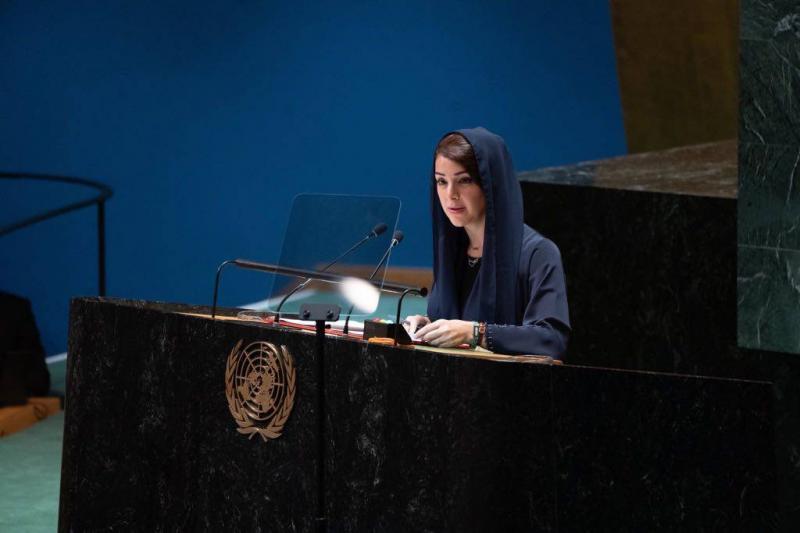The UAE's Minister of State for International Cooperation, Reem Al-Hashimy, stated at the United Nations General Assembly on Sunday that the UAE emphasizes that the peaceful path is the optimal way to address crises in the Middle East. In her speech, Al-Hashimy stressed the need for "serious discussions to reform the Security Council." She added, "Dividing the world into those for or against has not resulted in any political solutions and will not leave any party victorious."
Al-Hashimy addressed important issues, raised at a time when the international system is facing escalating crises. She said, "The UAE has chosen to make this year the Year of Sustainability, under the slogan 'Today for Tomorrow,' recognizing its responsibilities towards current and future generations who deserve to live in safe, prosperous environments, and honoring previous generations who spared no effort to elevate and develop nations, while being committed to preserving our planet and its rich resources and civilizations."
In this context, Al-Hashimy highlighted the importance of this approach amid the existential battles the world faces today, whether it be in confronting armed conflicts, climate change, and waves of extremism, racism, and hate speech that are sweeping across the globe. She added, "Addressing these challenges has become more feasible now than ever, especially with our advancements in technology, which allow us to find innovative solutions for complex challenges."
Al-Hashimy noted the importance of maintaining an international system based on the respect of states' sovereignty, independence, and territorial integrity. She stated that resorting to force instead of political solutions and dividing the world into 'with us or against us' will only lead to more chaos and the scattering of diplomatic efforts, confirming the necessity to respect political and developmental differences and diversity.
She emphasized that a peaceful path is the best way to deal with crises, saying: "Our region has been torn apart by the force of arms and extremist rhetoric, and we spare no effort in calling for de-escalation and promoting dialogue and diplomacy to resolve disputes. At the same time, we aim to enhance economic connectivity between countries in the region as a tool to create a new reality of integration that will lead to regional stability and prosperity."
Al-Hashimy addressed the issue of the UAE's call for Iran to end its occupation of the three UAE islands of Greater Tunb, Lesser Tunb, and Abu Musa, saying: "No matter how long this issue persists, our legitimate right to these islands remains intact, and time will not nullify our sovereignty over them or stop us from demanding a resolution, either through direct negotiation or the International Court of Justice. This has been the UAE's firm position for decades."
She spoke about climate, food, energy, and water security crises, asserting that the climate change crisis is a pivotal phase the world is experiencing today. While some view the radical change needed to prevent global temperatures from rising above 1.5 degrees Celsius as impossible, the UAE sees it as achievable.
In this regard, Al-Hashimy noted the UAE's preparations to host the twenty-eighth session of the Conference of the Parties to the United Nations Framework Convention on Climate Change in about two months, stating, "The conference's action plan will focus on four key areas: accelerating an organized and equitable transition in the energy sector, developing climate finance mechanisms, and focusing on livelihoods and community protection within a framework of transparency and inclusivity."
She clarified that regarding the problem of water scarcity globally, the UAE is making significant efforts to establish new models of international cooperation in the water sector and to prioritize this issue in multilateral work. Recognizing this, her country seeks to work with international partners to find effective solutions to this problem, which was outlined in the paper published by the Ministry of Foreign Affairs today, hoping it would contribute to outlining the necessary context to achieve this goal.
The UAE believes that collective action is no longer an option but a critical necessity, and today's decisions will have repercussions for decades to come. Minister Al-Hashimy stated, "Our choice is peace, our path is development, and our destination is the future. We see in our youth new leadership potentials, promising a bright future built on the achievements we have made."
Finally, Al-Hashimy expressed the UAE's sincere condolences and sympathy to the governments and peoples of the Kingdom of Morocco and the State of Libya for the victims of the recent disasters that have struck the two brotherly countries.




